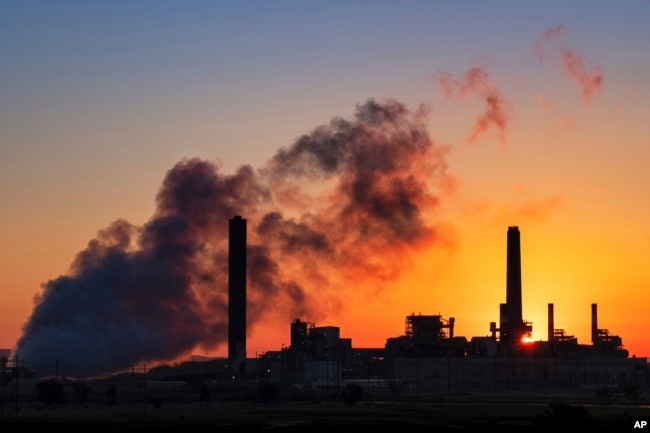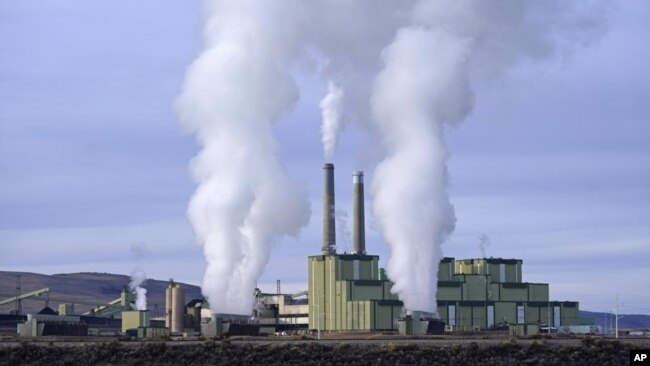何がどうなっているのでしょうか?
排出規制制限権限に規制をかける判決!!
迷走する米国議会に、米国最高裁。
温暖化対策は後退するのみ!!
VOAで英語を学びましょう!
米国最高裁、環境保護庁に制限を課す(和訳)
US Supreme Court Places Limits on Environmental Agency
July 01,2022
米国連邦最高裁判所は木曜日、発電所からの炭素排出を削減するための連邦政府の権限に制限を設ける判決を下しました。
この判決は、大気中への炭素ガス放出を削減することによって気候変動に対処しようとするジョー・バイデン大統領の計画に直ちに影響を与えます。また、政府機関が規則や規制を定める権限について、新たな法的問題を提起しています。
科学者たちは、二酸化炭素などの温室効果ガスが熱を閉じ込め、大気を温暖化させると言います。
今回の判決は6対3で、環境保護庁(EPA)が大気汚染防止法に基づいて既存の石炭やガスを燃料とする発電所からの温室効果ガス排出を規制する権限を制限しました。同裁判所の6人の保守派は多数決で、3人のリベラル派は反対しました。
木曜日の判決で、高裁はドナルド・トランプ前大統領のAffordable Clean Energy ruleアフォーダブル・クリーン・エナジー規則を打ち消した2021年の下級審判決を覆すことになりました。バイデン政権が維持したくないとしているその規制は、既存の発電所からの排出を規制するEPAの権限に制限を設けるものです。
バイデン政権は、2030年末までに全米の温室効果ガス排出量を半減させることを目指しています。2035年までに排出のない電力業界を目指したいとしています。発電所は、米国で排出される二酸化炭素の約30%を生産しています。
ジョン・ロバーツ最高裁判事は、裁判所の多数意見を書きました。彼は、大気浄化法はEPAが提案したような方法で排出量に制限を設ける権限を与えていないと書いています。そして、議会はこの問題について明確に発言しなければならないと述べました。
「このような重大かつ結果的な決定は、議会そのものか、その代表機関からの明確な委任に従って行動する機関にかかっています。」と、彼は書いています。
保守派の活動家たちは、”行政国家との戦い”と呼ばれるような、当局の権限を縮小する方策を長い間支持してきました。彼らは、広範な重要性と社会的影響のある問題については、議会で議員に権限を与えてもらうことを望んでいます。
1月には、バイデン政権がCOVID-19の大流行に対処するために行った大企業向けのワクチン政策も、保守派の判事たちによって阻止されました。
エレナ・ケーガン判事は反対意見の中で、今回の多数決は”現代における最も差し迫った環境問題”に対処するために議会が同機関に与えた権限を奪うものだと述べています。
さらにケーガン判事は、多数決の目的は明確であるとこう付け加えました:「議会が指示したことであるにもかかわらず、機関が重要な仕事をするのを阻止するものである。」と。
複雑な争点
司法長官は2月28日、この訴訟の弁論を聴きました。それは、国連の報告書が、気候変動の影響がはるかに悪化しようとしていると警告したのと同じ日でした。その報告書によると、地球の温暖化によって、今後数年のうちに人々はより病気になり、より空腹になる可能性が高いと言います。
民主党のチャック・シューマー上院院内総務は、この判決を批判しました。彼は、この判決を "危険なほど見当違いで、忌まわしいもの "と呼んでいます。
シューマー氏は、銃や人工妊娠中絶に関する裁判所の判決と同様に、木曜日の判決も”より多くの不必要な死を引き起こすだろう- この例では、気候危機を悪化させ、我々の空気と水の清潔さと安全性を低下させる汚染物質が増えるから”と述べています。
共和党のケビン・クレイマー上院議員は、この判決を賞賛しています。この判決は、"議会は決して連邦政府が州のために温室効果ガスの排出を規制することを意図していない "ことを再確認したと述べています。
この判決は、同裁判所の今期の判決最終日に出されました。この日は、アフリカ系アメリカ人女性として初めて最高裁判事に就任したケタンジ・ブラウン・ジャクソン氏の宣誓式も行われました。
US Supreme Court Places Limits on Environmental Agency
The U.S. Supreme Court on Thursday established limits on the federal government’s power to reduce carbon emissions from power plants.
The ruling immediately affects President Joe Biden's plans to deal with climate change by cutting the release of carbon gases into the atmosphere. It also raises new legal questions about government agencies' power to set rules and regulations.
Scientists say greenhouse gases, such as carbon dioxide, trap heat and cause the atmosphere to warm.
The court's six-to-three ruling restricted the Environmental Protection Agency's (EPA) power to regulate greenhouse gas emissions from existing coal- and gas-fueled electricity plants under the Clean Air Act anti-pollution law. The court's six conservatives were in the majority decision with the three liberals disagreeing.
With Thursday’s ruling, the high court overturned a lower court decision in 2021 that had struck down former President Donald Trump's Affordable Clean Energy rule. That regulation, which the Biden administration has said it does not want to keep, would set limits on the EPA’s power to regulate emissions from existing power plants.
The Biden administration aims to cut the nation’s greenhouse gas emissions in half by the end of 2030. It says it wants to have an emissions-free power industry by 2035. Power plants produce about 30 percent of carbon dioxide released in the U.S.
Chief Justice John Roberts wrote the majority opinion for the court. He wrote that the Clean Air Act does not give the EPA the power to place limits on emissions in the way it proposed. He said Congress must speak clearly on this subject.
“A decision of such magnitude and consequence rests with Congress itself, or an agency acting pursuant to a clear delegation from that representative body,” he wrote.
Conservative activists have long supported measures to reduce agency power in what some called a "war on the administrative state." They want lawmakers in Congress to authorize action on issues of broad importance and societal impact.
In January, the conservative justices also blocked the Biden administration's vaccine policy for large businesses meant to deal with the COVID-19 pandemic.
In her dissent, Justice Elena Kagan said the majority’s decision takes away the power that Congress gave the agency to deal with “the most pressing environmental challenge of our time.”
Kagan added that the majority has a clear goal: "Prevent agencies from doing important work, even though that is what Congress directed."
Complicated issues
The justices heard arguments in the case on February 28. That was the same day that a United Nations report warned that the effects of climate change are about to get much worse. It said the warming of the earth would likely make people sicker and hungrier in the coming years.
U.S. Senate Majority Leader Chuck Schumer, a Democrat, criticized the court's ruling. He called it "dangerously misguided and abhorrent.”
Schumer said, like the court’s ruling on guns and abortions, Thursday's decision "will cause more needless deaths - in this instance because of more pollution that will exacerbate the climate crisis and make our air and water less clean and safe."
Senator Kevin Cramer, a Republican, praised the decision. He said the ruling restates that “Congress never intended the federal government to regulate greenhouse gas emissions for the states."
The decision was issued on the final day of rulings for the court's current term. The day also marked the swearing-in of Ketanji Brown Jackson, the first African-American woman on the Supreme Court.
Words in This Story
regulation –n. (usually pl.) an official rule or law that says how something should be done
magnitude –n. size, extent or importance
consequence –n. importance, value
pursuant to –prep. in a way that agrees with or follows something
authorize –v. to give legal or official approval
dissent –n. to publicly disagree with an official opinion, decision, or set of beliefs
exacerbate –v. to make a situation worse than it already is
intend –v. to have something in mind as a purpose or goal

